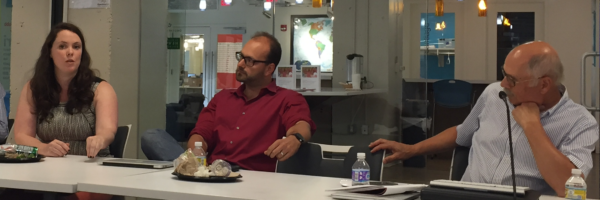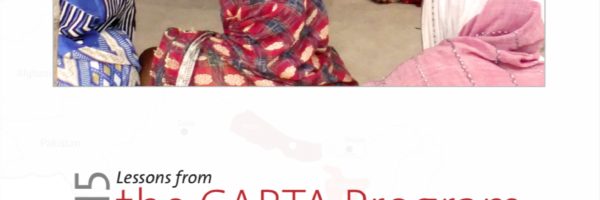The Citizen Action for Results, Transparency and Accountability (CARTA) program was a unique monitoring model that aimed to provide donors and development agencies with more specific and real-time information on the impact of their projects. By building the capacity of local CSOs to conduct donor project monitoring, CARTA strengthened ownership of outcomes, reduced the propensity of corruption and increased overall citizen engagement.
Donors are recognizing the benefits of citizen engagement, social accountability and participatory monitoring as means to improve the impact of development projects. However, these activities are typically supervised, framed and funded by donors themselves, giving rise to potential conflict of interest for beneficiaries and evaluators.
In theory, placing the funding, reporting, and other management functions with an independent third party will improve participatory monitoring by encouraging more effective community engagement, more honest feedback and more constructive stakeholder engagement. By the same token, building citizen capacity to demand good governance has been shown to reduce the overall propensity for corruption in development projects.
Typically, monitoring and evaluation mechanisms are directly funded by the World Bank creating a conflict of interest for beneficiaries and evaluators. CARTA’s funding, provided by the Japanese Social Development Fund, and reporting channels are independent of the World Bank and provide new opportunities to meet on-the-ground needs. The overall goal of the pilot program was to “enhance the development impact, sustainability and client ownership of pro-poor projects financed by the World Bank in Bangladesh and Nepal, by promoting civil society organizations engagement, experience and capacity to demand better governance.” It built the capacity of local CSOs to monitor the implementation of donor-supported projects. This program marks the first time a major development organization has permitted independently financed participatory monitoring managed by a third-party.
PTF collaboratively managed the CARTA program with the Manusher Jonno Foundation in Bangladesh and Helvetas Swiss Intercooperation in Nepal. Twelve sub-grants were awarded, 6 each in Bangladesh and Nepal, for a total of US$1.29 million to support 11 World Bank-financed projects in infrastructure, health, education and local government. The sub-projects differed in scope, but all focused on empowering beneficiaries to demand greater transparency and accountability in resource use, delivery of services and grievance resolution. Local CSOs, government agencies and World Bank staff benefited from periodic trainings, workshops and technical support from PTF Project Advisers.
The CARTA program’s final report describes results and lessons in each sub-project in more detail, but the main lessons are that:
- There is a need to work on both the demand and supply sides while promoting social accountability;
- The need for adopting a constructive engagement approach in order to be trusted by project implementers and national stakeholders;
- The challenge of engaging traditionally marginalized community groups involves a greater effort by all stakeholders;
- Citizens and CSOs need training to create levels of knowledge and skills that empower them to engage constructively with service providers.
- Independent monitoring can be a valuable tool in catalyzing citizen engagement, not only because it builds self-reliance, but because it induces service providers to be more accountable.
- Social accountability tools and data-collection methods that are intended for use by citizens in the future should be as simple as possible.
- The sustainability of future citizen engagement depends on many factors—incentives, cultural factors, and power relations. Many of these take time to change; therefore short-term interventions will not likely be able to demonstrate results in the short term.
In 2011, 12 sub-grants were awarded under the CARTA program, 6 each in Bangladesh and Nepal, for a total of US$1.29 million to support 11 World Bank financed projects in infrastructure, health, education and local government.



